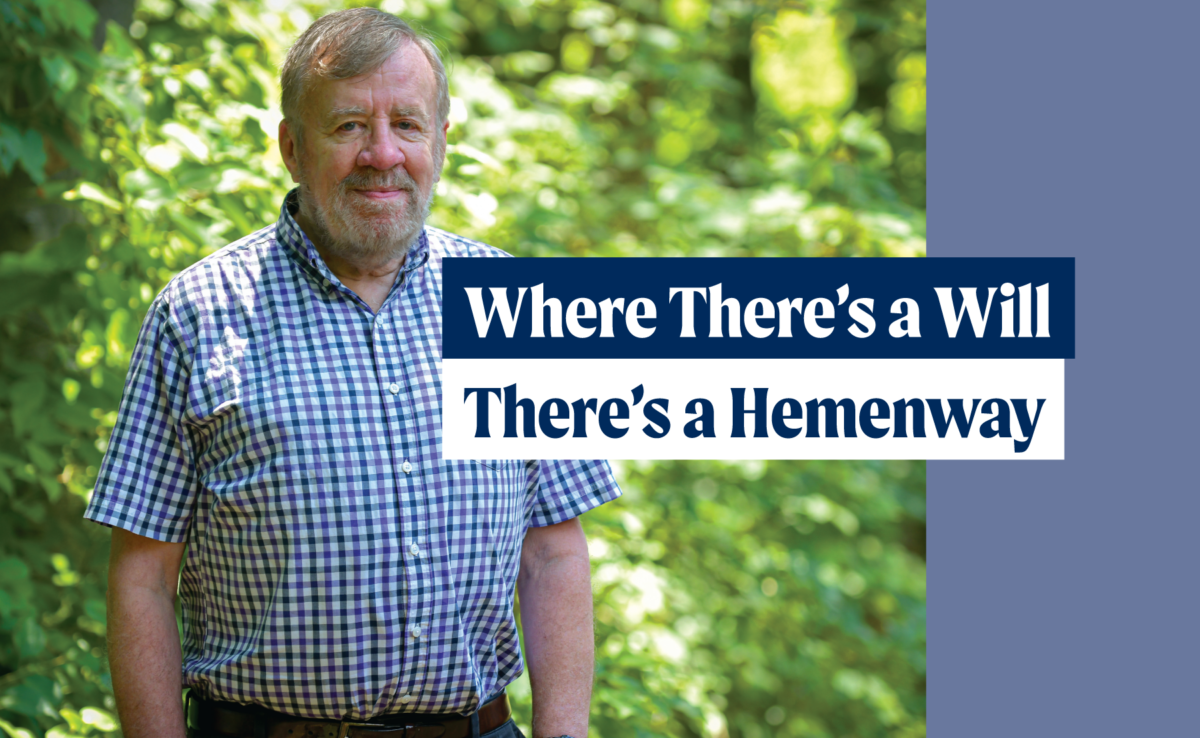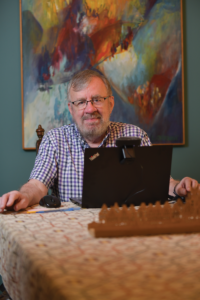Where There’s a Will There’s a Hemenway
Last November, when Dr. Stephen I. Hemenway was honored for 48 years of creativity as an English professor at Hope by being named the first recipient of the college’s Betty Roelofs ’53 Miller Endowed Professorship, he delivered a five-minute acceptance speech.
In rhymed couplets.
“Arriving at Hope, I was labeled weird:
Single, Irish Catholic, donning a beard.
I hoped I would make it through the first year,
But now Hope officials are filled with fear
Since I never utter the word ‘retire.’
My guess is that these folks would gladly hire
A younger prof, but I still have the fire,
The wonder, the joy, the will to inspire.”
Always expect the unexpected where Stephen Hemenway is concerned. This year, however, the unexpected struck back.
He has had oodles of time to compose new verses — rhyme on his hands, if you will — because this summer COVID-19 concerns kept Hemenway at home in Holland instead of in Europe, where he has performed double duty as director of Hope’s celebrated Vienna Summer School program since 1976.
This would have marked his 45th consecutive year of hiking in the Alps, hosting a floating barbecue for students on Lake Neusiedl, arranging guest speakers and changing the lives of young people whose first-ever international experience may be Vienna Summer School, more than 2,500 in all.
As you might expect, his body clock is a bit off.
“I’m just thinking every hour what I would be doing there now,” Hemenway, 78, admitted during a Zoom conversation recently. “This probably will stop in time, but it’s hard because this would have been year number 45. I’m in a lot better shape than some people right now, so I’m not complaining. But it is very different.”
It’s been different at home, too. Since the coronavirus forced Hope’s campus to shut down in March, Hemenway has taught his classes online for the first time in his career. Like the rest of the Hope community, though, he’s been adjusting. He has even acquired a laptop computer for use at home since he’d been relying on the machine in his office in Lubbers Hall — which some might say is his primary residence — and in characteristic fashion has made the best of the moment.
“I’m not lying; I have enjoyed the challenges of teaching online much more than I expected, and I got superb assistance from tech-savvy students,” he says. “And I want to improve because I need to do things so much better.”
Those who have taken courses from the man the Council for Advancement and Support of Education once named Michigan’s “Professor of the Year” and former recipient of the Hope Outstanding Professor Educator (H.O.P.E.) Award may wonder how much better he can get. Over the decades Hemenway has taught everything from Black Literature to Catholic Fiction, British Lit to the Beatnik Generation. He even created the foreseeable course “Hemenway on Hemingway,” prompting him to visit Cuba and witness the running of the bulls in Pamplona, Spain, to gain insights on the legendary novelist.
However, his freshman Expository Writing 1 course, “Crime and Punishment,” is itself the stuff of legend. Brian Gibbs ’84, Hope Board of Trustees member and resident of Germany who served as Hemenway’s Vienna assistant for years, still vividly remembers the number of the class — English 113 — and the impact it made on him.
“He probably can’t do much of this today,” Gibbs reflects, “but back then on our first day of class, we had to line up, write our student numbers on stickers and put them on our foreheads, have mug shots taken. It was the ‘Hope College House of Correction for Grammatical Imperfection.’ Our first assignment was to write a reaction paper about the experience. How did it feel to be intimidated? Depersonalized? I just think he is an outstanding professor. He’s creative, and he’s not afraid to employ gimmicks.”
Such as his “nonpapers,” his students’ non-written reactions to the literature Hemenway dissects in class. Their responses can be artistic or theatrical, musical or mechanical, as long as they convey understanding of the subject matter. Hemenway’s home is filled to overflowing with “nonpapers” past — including one student’s hand-tossed Grecian urn with scenes from Homeric poems inscribed upon it.
Hemenway’s relationships with the Hope student body are also a hallmark. He has been an honorary member of the Cosmopolitan Fraternity (“One canoe trip was more than enough”), advisor to the Cosmos and Delta Phi Sorority, and founded the Environmental Issues Group. He frequently invites students to his home for dinner to sample his renowned cuisine, and grateful alums return the pleasure. Assistant Professor of Communication Rob Pocock ’77, a former Hemenway student now a faculty peer, and his wife Cindy (Arnold ’75) have hosted him and encouraged their daughter, Kate, to accompany him to Vienna even though she attended Wittenberg University in Ohio.
“One of my biggest regrets is never having chosen to go to Vienna,” Pocock admits. “One of the courses I teach is Public Presentations, and over the years many students chose to speak about Vienna Summer School. It is a life-changing experience for the majority of people who go.”
English 113 was full when Pocock was a freshman. He begged Hemenway to let him enroll. “He said, ‘Write a paper telling me why you should attend,’” Pocock recalls. “Because it was ‘Crime and Punishment’ I wrote him as though I was a prisoner. He said, ‘I’ll let you in, but it would have been so much better if you’d written it in crayon — prisoners aren’t allowed to have sharp objects!’”
“I don’t want to overstate, but I think the first time I was exposed to true creativity in the classroom was through Steve. The way he invests in his students is just unbelievable.”
And his students apparently appreciate it. “There’s hardly a summer where somebody doesn’t show up in Vienna and say, ‘Do you remember me? I was in your program in 1982,’” Hemenway says. “Or our students will be wearing Hope shirts around Vienna and someone will ask, ‘Hope College? Are you in the Vienna program? Is Dr. Hemenway still alive?’ I love that one.”
Dr. Stephen I. Hemenway is alive, thriving, and as passionate about teaching as ever. In 2022 he will have been at Hope for 50 years, a milestone. How much longer will he continue? Let’s refer to his endowed professorship acceptance poem:
“I relish my teaching, the best of careers.
This chair is my prize for the next ten years,
And I just learned that it’s renewable.
I’ll have to see if this is doable.
Shall I dream that in 2029
Betty Miller’s endowed chair will still be mine?
If I have not yet arrived in heaven,
I’ll reapply at age eighty-seven!”


